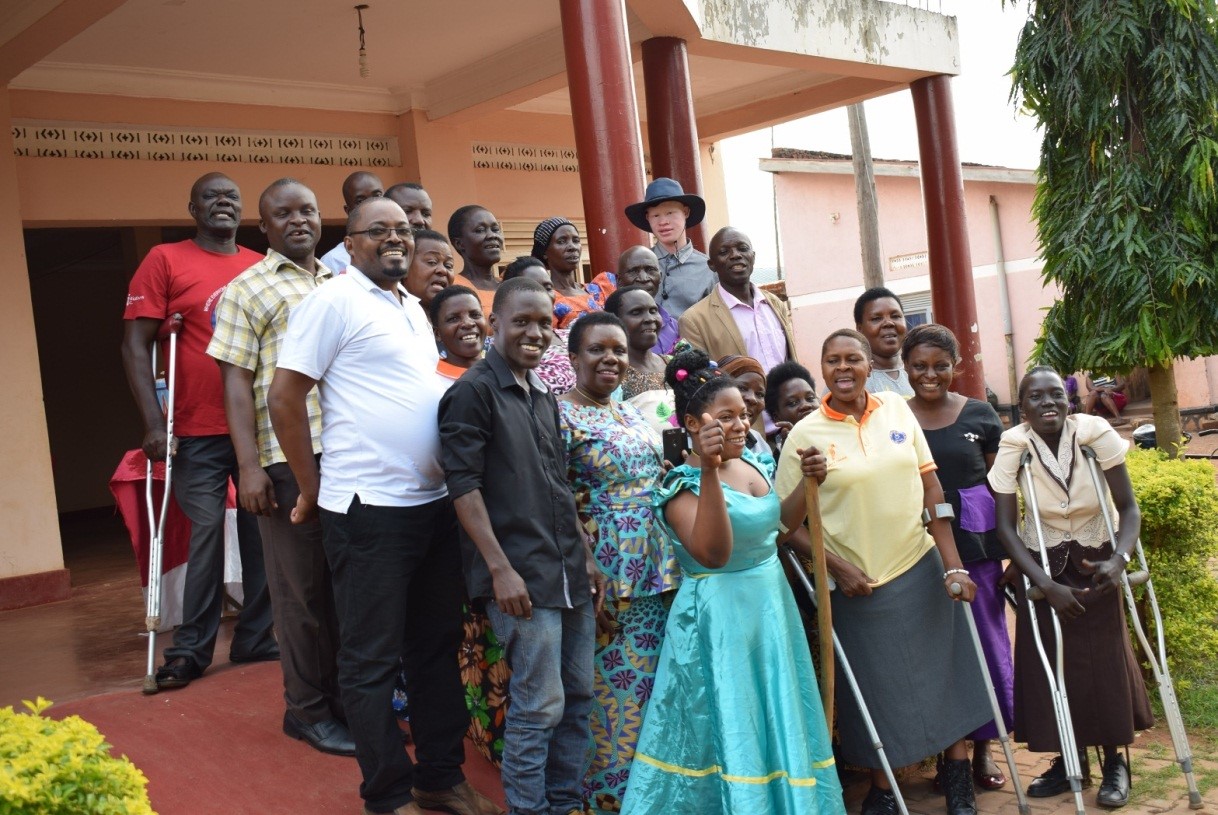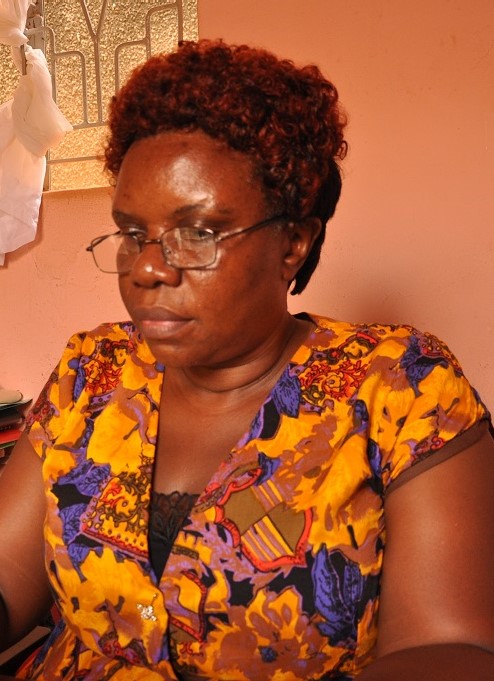1.0 ORGANIZATIONAL BACKGROUND IDIWA Uganda is an indigenous not for profit non-Governmental Organization established in2000 by women of different disability categories including Physical, Sensory and Psychosocial disabilities and Parents of Children with Disabilities in Uganda, on realization that Women and Girls with Disabilities face heightened discrimination on account of gender and disability, and this limits their access to services. The organization is focused on empowerment of Women and Girls with Disabilities by advocating for improved access to services, resources (ownership and control), participation in democratic and governance processes, economic opportunities and respect for human and health rights. This is done through training, advocacy and lobbying, and networking and collaboration with duty bearers and community members. IDIWA envisions an inclusive society in which human rights, citizenship, and potential of women and girls with disabilities, and other vulnerable groups are respected. The mission is to empower women and girls with disabilities, and other vulnerable groups to maximize their potential and improve their standard of living. Our overall goal is to improve the quality of life and social well-being of women and girls with disabilities, and other vulnerable groups in Uganda. 2.0 PROJECT BACKGROUND Article 23 of the Universal Declaration of Human Rights states that “everyone has the right to work, to free choice of employment, to just and favorable conditions of work and to protection against unemployment without any discrimination, and the right to equal pay for equal work.” Similarly, the UN Convention on the Rights of Persons with Disabilities 2006 (CRPD) provides that state parties must recognize the right of PWDs to work by prohibiting discrimination on grounds of disability. The CRPD requires state parties to establish effective access to general technical and vocational guidance, ensure that reasonable accommodation is provided to PWDs at the workplace, protect the rights of PWDs on an equal basis and promote vocational and professional rehabilitation, job retention and return to workplace programmes for PWDs. Read more from the link below:
Terms of Reference for designing Real time software for Monitoring and Evaluation
Justification for Real time software for monitoring and evaluation IDIWA is adjusting its analytical approaches, policies, programs and monitoring systems to sharpen its focus on results. As part of this effort, IDIWA is strengthening its approach to monitoring to accelerate results based reporting by ensuring that timely and high quality data are used to monitor and evaluate all programs. Field Data collection using traditional methods has been associated with lots of Challenges such as high costs of surveys, field handling of bulky survey tools, cumbersome and costly data entry, delay in data availability after survey, among other challenges. Electronic/Computer Assisted Personal Interviewing (CAPI) and Computer Assisted Telephone Interviewing (CATI) methods for data collection are gaining prominence. Internet and mobile phone availability among populations, even in some remote communities, have grown so rapidly, enabling electronic data collection methods to flourish. The electronic methods are cheaper, more efficient and lead to more accurate data. It is against this background that IDIWA is shifting from paper based monitoring of programmes/projects to online monitoring and evaluation system. For more information, click on the link below:
Season’s Greetings
#IDIWA@20; SOARING TO NEW HEIGHTS” To all our friends and well wishers and development partners, as we close for the Xmas holiday, we thank you for your generous support throughout the year 2019. It has been a year of hard work, challenges and rewarding experiences. It would never be possible without you. IDIWA wishes a Merry Xmas and Happy New Year 2020.
Executive Director’s message
I welcome you to third issue of IDIWA News, and I bring warm greetings from IDIWA family. In this issue, I happy to share with you our esteemed readers, the findings of our filed monitoring and impact of the various programs implemented by IDIWA. The Monitoring and Evaluation function is critical for developing, testing and implementing effective M&E systems in order to ensure successful program implementation that brings about sustainability of results of various programs we implement. The period of April to June 2017 was characterized by monitoring of all programs in Iganga, Mayuge and Luuka districts, with more emphasis to those that will be closing in December 2017. The Economic Empowerment and Livelihoods Project is one of those slated to end in December 2017, and has registered a lot of positive impact among Women with Disabilities in Iganga. The project has increased household income, capital for IGAs, use of skills/new technologies, access to financial services among WWDs. Previously, 87% of the beneficiaries earned less than UGX20,000 a month while 9% earned between 110,000 – 200,000. The number of WWDs earning less than 20,000 reduced from 87% to 71% while those earning between 110,000 -200,000 increased from 8.78% to 18.48%. This is clear indication that incomes are steadily increasing because of the project interventions. All WWDs now had access to financial services especially by the IDP SACCO and at least 38% of the beneficiaries had accessed a loan. 48% of the IGAs/businesses are doing well while 2% of the beneficiaries were performing excellently. Most of the beneficiaries in business had not yet picked up with the issue of using skills taught majorly because of education limitations, however, those in Agriculture were practicing the skills. Most of the EELP beneficiaries (WWDs) did not have capital before the project, however capital was as seen to be increasing though at a slow pace. Th Disability Budget Advocacy Project ends in December 2017. The project has increased compliance to accessibility standards in public facilities in Mayuge and Luuka districts. The facilities include; district council halls, and selected schools and health centres. The two district fulfilled all commitments made during the project launch in 2017. 90% of the District offices in Luuka and Mayuge were now accessible something which didn’t exist before the project. PWDs are raising voices to demand for their inclusion in government programs such as operation wealth creation, Community Driven Development (CDD). The Special Grants Committee in Luuka was streamlined in line with the national guidelines; this has enabled balanced representation of the DPOs and NGOs on the Committee, which brings about checks and balances for equitable allocation of resources to PWDs. We are witnessing positive changes in Iganga, the district awarded bursaries to three PWDs in tertiary institutions. This is a step towards implementation of the Iganga PWD Ordinance, 2013. However, there is a big challenge where parents and care givers are failing to provide transport to such students benefitting from the bursary scheme. In Nambale sub county, adjustable labour beds were included in budget for FY 2017/18. The Councilors for PWDs are empowered, to stand up to duty bearers and influence development decisions and services to their constituents. The partnership project on Strengthening Retention of HIV Positive Mothers and Exposed Infants has yielded positive results; mothers and exposed infants who were lost to follow up are back into care, which enhances the quality of life; they can openly talk about their condition and provide support to others. However, some clients’ files from target health centres, were not up-to date and missed information such as appointment dates, PCR results, EID infant cards; mothers moving from one health facility to another for routine Antenatal Care-ANC and Postnatal Care-PNC services, which to a greater extent affected our data collection efforts and to generate key project indicators. I thank the Monitoring and Evaluation team for trekking the project districts and documenting this information without which, our closeout strategies would not be possible. I am grateful to the Board of Directors for the continued guidance and wise counsel, and Development Partners for supporting our work. Specific appreciation is extended to the Independent Development Fund for supporting this publication. GOD BLESS YOU.


